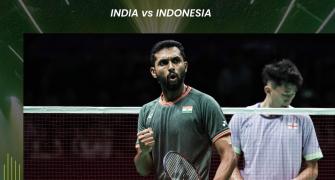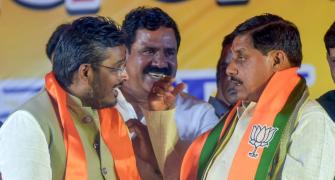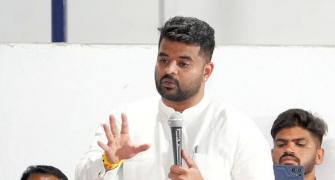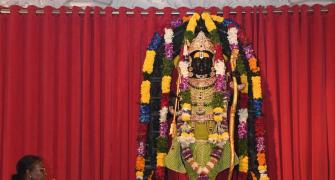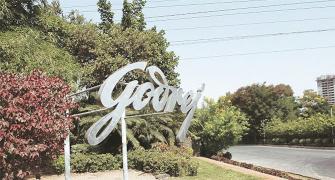
Who had ever thought that the Bharatiya Janata Party would one day have to contend with competition from the Jan Sangh?
After all, almost the entire senior crop of the BJP is a product of the Jan Sangh.
But Indian politics has come a long way since Dr Shyama Prasad Mukherjee founded the Jan Sangh as the political arm of the Rashtriya Swayamsevak Sangh.
In 1977, most of the Jan Sanghis, as they were called, joined the Janata Party. Only a few stayed back.
The BJP now heads a coalition. It has also been softened by five years in power at the Centre.
Its leaders speak more about foreign direct investment and less about Hindutva and Hindus.
Prafull Goradia, 67, is an RSS member and a former Rajya Sabha member of the BJP.
He has written four books to propagate RSS beliefs -- Saffron Book, Hindu Masjids, Unfinished Agenda and Anti-Hindus.
Goradia has just resigned from the BJP and is in the process of reviving the re-registered Jan Sangh.
His calculation is that the BJP's dilution of Hindutva has left behind a huge constituency of Hindus in search of a new Hindu nationalist political party.
He also understands that in an era of coalition politics, small parties play an important role.
While talking to Senior Editor Sheela Bhatt, he complains that in pursuit of power, the BJP, under Atal Bihari Vajpayee's leadership, has abandoned its core values.
What are you up to now?
I have become a general secretary of the Jan Sangh.
It is a party founded on October 21 in 1951 by Dr Shyama Prasad Mukherjee.
In 1977, most of its members joined Jayaprakash Narayan's Janata Party.
Professor Balraj Madhok and a few of his colleagues didn't join the Janata Party. But the Election Commission took a view that since most members had left the Jan Sangh, it would have to be reregistered by Prof Madhok. The symbol of deepak (lamp) continues to be the party symbol.
It is a recognised political party but its symbol is not recognised for ballot papers. We have just opened an office in Daryaganj, Old Delhi.
Why did you leave the BJP?
I resigned because the BJP abandoned Hindutva.
I joined the BJP in 1990 with hopes of realising dreams of Hindutva. Unfortunately, because of the so-called compulsions of the National Democratic Alliance, the BJP diluted its agenda. But later I found that there was a positive policy of diluting Hindutva; it was not merely the NDA's compulsion.
When the Gujarat riots happened none of the NDA partners said anything.
Then it struck me that the BJP did not have any compulsions. Nobody was even ready to speak about Gujarat. We were repeatedly told to keep the Hindutva agenda on the backburner because the NDA partners would be displeased.
At the party meeting in Goa two months ago, the BJP decided that the word Hindutva is unnecessary. We were told that when you talk of cultural nationalism, it includes Hindutva.
BJP members openly said that it is not possible to run a government along with Hindutva. Flying a tricolour is not Hindutva; it is much bigger. It is a philosophy that grows out of the basic tenets of Sanatan Dharma.
To not talk loudly about Hindutva could be a strategy, no?
Vajpayee became PM and not Advani because maybe the party thinks that a moderate leader is more acceptable than a hawkish leader.
It must be Vajpayee's strategy. But I think deviating from what you believe in to get power is unethical. You may agree with Vajpayee, I don't.
When even the word Hindutva became an embarrassment to the BJP, I understood that my time was up and I decided to quit.
For the sake of power the word Hindutva became an embarrassment to the BJP. To become PM was his priority, and not my priority.
But maybe Vajpayee knew that most Indians wanted to see a softer face of Hindutva
Not true. In 1999 Kargil saved us and gave us a good 30 seats [in the ensuing general election]. The last election proved that Vajpayee was not right. He didn't get even a few Muslim votes and he lost Hindu votes in millions. If the larger part of India wanted the pale saffron of Vajpayee, than he would have got 250 seats and not 138 seats.
But the BJP lost for many other reasons.
I disagree. Look at Narendra Modi in Gujarat. He won without Muslim votes.
The BJP's cadres, workers sat at home and didn't canvass for the Vajpayee government. The people of India are frightened by the Islamisation of India.
Our leaders are not in touch with ground realities. They are led by [M Venkaiah] Naidu [editor's note: Naidu has since made way for Advani] and [George] Fernandes and have been led astray.
What did Mr Vajpayee do about the security? Our Parliament is not safe. After the Parliament attack, are we any safer? No wonder he lost the election.
Why did you leave the BJP after it lost power?
Because even after losing power they are going in the same direction. They are not returning to the path of Hindutva.
I am leaving the BJP because the Hindu civilisation is under threat.
I would like to go into Waqf-owned land. We abolished the zamindari system long back, but Waqf boards are the largest property owners in India. Why are they outside the purview of the Land Ceiling Act?
In many Waqf boards beneficiaries are family members. Why do you require such huge lands for maintenance of masjids? We pay more taxes and still they get subsidy for Haj yatra.
As in Pakistan, in India Muslims don't need to even take the permission of their first wife before marrying a second. Why?
Why did you not take up these issues when the BJP was in power?
They told me, 'Wait. Keep quite. Otherwise the NDA will disintegrate.'
Even the articles I wrote for party papers were not allowed to be published. In the name of the NDA everything was swept under the carpet.
Did Advani help you? He represents the BJP's Hindutva face.
I went to him. I have been observing him for many years. I am convinced that he has been faithfully toeing Vajpayee's line since 1990, at least.
And I am sure that in his lifetime he is not going to chart his own way. Advani is a faithful member of the BJP, whose leader happens to be only Vajpayee. I have seen this from the inside.
The 'secular' media and political parties have enjoyed dividing the parivar in public domain.
You will end up dividing BJP votes.
Division and addition are arithmetic. I am saying let us stand up and save the Hindu civilisation, which is very valuable to the world.
For the first time the Hindu civilisation is not alone in this battle; Christians, Jews and even Chinese are fighting them. In history there has never been a moment when Jews and Christians have been on our side.
At last history is on our side.
India has survived for ages and there is no reason why it should not survive. Why do you have such fears?
That is your perception. Madam, look around. In the Indian subcontinent in the 18th century Muslims were only 10 per cent. Today the Muslims population is 40 per cent in the same geographical area.
The situation is worse than it was in the pre-Partition era. Where are we going? We got nothing after giving away one quarter of our land in 1947 and still you say that we are all right? Well, fine. Good luck to you. But I am unhappy on this count.
Do you have the RSS' blessings?
I am a part of the Sangh Parivar.
Prof Balraj Madhok, who lives in Delhi, heads the Jan Sangh. Although he is 85, he is doing well. He is disappointed to see the BJP deviating from Hindutva. He has never compromised. Some may say that he is living in utopia, but it is better to live in utopia than to sell yourself for power.
The Jan Sangh is still recognised as a member of the Sangh Parivar.
Whenever I go to the VHP or BJP office, I feel at home. We are not going to undercut the Hindu votes of the BJP or Shiv Sena.
Whenever elections come, we will ask for a fair share of seats. Our stronger Hindutva will get us the people's support.
How are you going to get support?
The Jan Sangh's legitimacy of Hindutva is beyond question. The Jan Sangh is a grandparent of the BJP. It never got electoral success because of the greatest blunder of Nathuram Godse.
That put the whole movement of Hindutva back by 40 years. The common man was so revolted by the assassination of [Mahatma] Gandhi that he was simply not ready to listen to any other point of view, but the Congress' view.
We are drafting the Jan Sangh's manifesto.
We think [Jawaharlal] Nehru, who learned his economics from Russia, was a disaster. We will advocate employment-oriented development. We want to work for consolidation of Hindus. We will give one out of four seats to women.
The youth of India is in search of an identity. Don't think that their commitment to Hindutva is any less. Today's Indians have a wishy-washy identity. Communists are internationalist. They supported the Partition. Then there are the ulemas, who are supernationalists. They believe in Ummah. They don't believe in the Indian nationalism.
Where will you get money from?
Money follows votes and people's opinions. It is not other way round.
How is your Hindutva different from the VHP's Hindutva?
The VHP is more concerned with religious affairs and spiritual approach.
I am not ritualistic. I am prepared to go to masjid also. I have spent eight years learning Urdu. Mine is a political approach.
I believe Hindus are tolerant and cannot harm anybody. Hindus cannot be against anybody. My mother died in 1988. I don't know where her soul has been transferred. I do believe in transmigration of souls. It can be in a Christian lady or a Muslim man or may be in an animal. How can I kill anybody? That's why I am a vegetarian!
Headline Image: Uday Kuckian

